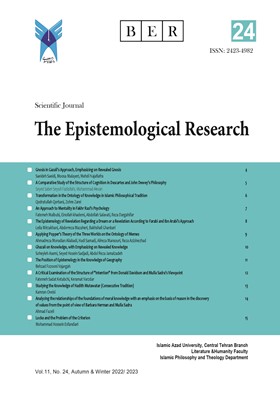An Approach to Mentality in Fakhr Razi's Psychology
Subject Areas : Epistemological researches
fatemeh malbubi
1
,
einollah khademi
2
,
abdollah salavati
3
,
Reza Dargahifar
4
![]()
1 - Ph. D. Candidate of Philosophy, Shahid Rajaee University, Tehran, Iran,
2 - Professor of Philosophy, Shahid Rajaee University,
3 - Associate Professor of Philosophy, Shahid Rajaee University
4 - Researcher in Institute of Iranian Philosophy
Keywords: soul, Fakhr Razi, mind, mentality, Mental State,
Abstract :
In the contemporary era, thinkers abandoned the issue of the mind in a way that gives rise to the idea that it is essence or material, and addressed the issue of what are mental states, what are their characteristics? On the other hand, Islamic thinkers has always been concerned to the human soul. Fakhr Razi, a famous Muslim theologian, has significant opinions in the discussion of philosophical psychology. He considers the soul to be different from the body, and he has studied a number of soul states and some of their characteristics. The current research deals with the question: what is the relationship between the states and qualities of the soul from Fakhr Razi's point of view and mentality in the contemporary philosophy of mind? In this search, some similarities between Fakhr Razi's opinions and contemporary mentality will be clarified; Emotional states such as pain and pleasure, and perceptual states from the point of view of Fakhr have certain characteristics such as the phenomenality and direct experience of these states for the soul. He has criticized Ibn Sina for not paying attention to these states in the definition of pleasure and pain. He also paid attention to science, which is one of the cognitive states, and it seems that by proposing the addition theory, he intended the consciousness for soul.
افلاطون. (1337). مجموعه آثار، ترجمه حسن لطفی، تهران: دانشگاه تهران.
حقی، علی، زختاره، ملیحه. (1389). «پژوهشی در حیث التفاتی برنتانو و تطبیق آن با نظریه اضافه فخررازی»، نشریه الهیات تطبیقی، ص 39- 52 ، شماره 4.
ذبیحی، محمد، پاشایی، محمدجواد. (1391). «نقد و بررسى وجود ذهنى از دیدگاه فخررازی»، پژوهشهای فلسفی کلامی، ص 205-225، شماره 51 .
رازی، محمد بن عمر. (1986). الاربعین، قاهره: مکتبة الکلیات الأزهریة.
همو. (1384). شرح اشارات و تنبیهات، تهران: انجمن آثار و مفاخر فرهنگی.
همو. (1373). شرح عیون الحکمه، تهران: مؤسسه الصادق.
همو. (1411). مباحث المشرقیه، قم: انتشارات بیدار.
همو. (1420). مفاتیح الغیب، بیروت: دار إحیاء التراث العربی.
همو. (1407). مطالب العالیه، بیروت: دارالکتاب العربیه.
همو. (1406). النفس و الروح و شرح قواهما، تهران: بی نا.
صدرالمتألهین. (1981). الحکمةالمتعالیة فى الاسفار العقلیة الاربعة، ج 4 و ج 8 ، بیروت: داراحیاء التراث.
مسلین، کیت. (1391). ترجمه مهدی ذاکری، درآمدی بر فلسفه ذهن، قم: پژوهشگاه علوم و فرهنگ اسلامی.
همتی مقدم، احمدرضا، صبوحی، علی.(1391). نظریههای مادی انگارانه ذهن، قم: پژوهشکده فلسفه و کلام.
- Descartes, René. (2003). The Principles of Philosophy, University of Glasgow.
-Kim, Jaegwon.(2011). PHILOSOPHY OF MIND, usa: westview press
- kind, Amy. (2020). PHILOSOPHY OF MIND THE BASICS, usa: Routledg
- Samuel Guttenplan. (1994). A Companion to the Philosophy of Mind, usa: Blackwell Publishers Ltd
- Ludwig, Kirk. (2003). <The Mind–Body Problem: Blackwell Guide to Philosophy of Mind, USA, Blackwell Publishing Ltd
- Garvey, James. (2011). The Continuum Companion to Philosophy of Mind, new York: Continuum publishing
_||_

